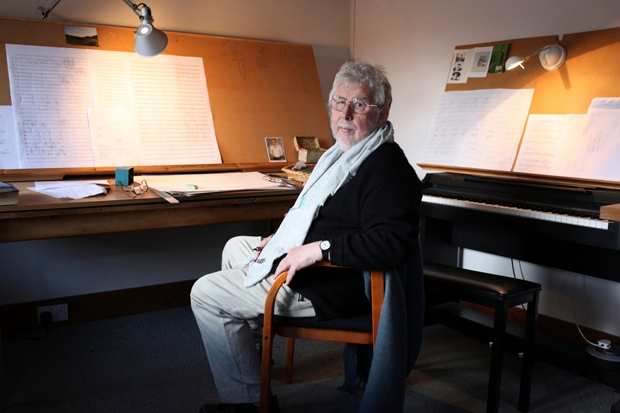One of the growth areas of contemporary music is in setting sacred texts. It might be thought that I had a special interest in claiming this, but in fact what I am about to describe represents a sea change in recent practice. Where there was once ‘squeaky gate’ (or ‘dripping tap’) music — as very dissonant writing used to be called — many leading composers are now writing in a style that is at least tonal and can occasionally seem almost naïve.
There was a time when the first performance of a recent commission struck fear into the most broad-minded listener. We used to brace ourselves for horror and were rarely disappointed. In those days, the struggle to write more atonally than the next man was palpable. No self-respecting composer would pen a concord if he wanted to be taken seriously by his peers: to do so was to be compared to those who made soft-harmony arrangements of famous melodies. Now soft harmony has become dignified, with all manner of clever names — tintinnabuli, holy minimalism; while popular tunes are quickly identified as being ‘chant’, and quoted whole.
There are two reasons for the change: the standard of singing in our liturgical and concert choirs has steadily gone up, to the point where many non-Christian composers now feel able to express themselves fully writing for them. And that expression has resulted in a genuinely wide-ranging idiom that has gained the respect of listeners far outside the normal Church-music confraternity. In short, sacred choral music has aligned itself with orchestral and operatic composition as an accepted medium for contemporary thought: concerts given by vocal ensembles are as admired and supported as concerts by instrumental ones. This, in turn, has resulted in such an increase in production that I would say this music has joined the symphony or concerto as a repertory to which every classical composer is keen to contribute.
Grand collections of big pieces have been put together in recent years, every item by a different composer. Forty-four composers had anthems included in the 2012 Choirbook for The Queen. Among them were names better known for quite other sorts of music: Peter Maxwell Davies, Michael Finnissy, Alexander Goehr, Richard Rodney Bennett and Mark-Anthony Turnage. In the more recent Merton Choirbook (put together to celebrate the 750th anniversary of the foundation of Merton College, Oxford in 2014) there are a similar number of composers, including Harrison Birtwistle, John Tavener, Jonathan Dove, Judith Weir, Gabriel Jackson and James MacMillan.
I think this across-the-board interest in a cappella composition is a very recent development. The 2012 Queen’s choirbook contains the names of some significant older composers who have spent much of their lives not feeling it necessary to set sacred texts, or write for choirs. However it is significant that among the Merton composers there are younger (though not necessarily young) composers whose core activity has been to write this kind of music. It seems somehow counterintuitive that that fiercely ‘modern’ idiom, which so alienated people years ago, should now be coming from the older generation, while younger composers make a career out of writing less demandingly. The odd ones out in this graph of activity are Pärt and Tavener, the original holy minimalists. They got there first with the soft-harmony style, having cut their teeth on more abrasive fare, showing how a new relationship with tonality could be both dignified and expressive — not the cop-out the rabid modernists so desperately believed it to be.
The difference between these two and Birtwistle is that Birtwistle came to the Church music party late. He didn’t contribute to the Queen’s choirbook for political reasons; but he contributed to the Merton book because he wanted at last to write some choral music (the only previous pieces by him were three motets taken from his opera The Last Supper). He is 80 this year, his reputation formed on operas and orchestral music: indeed his saxophone concertante, Panic, premièred at the 1995 Proms, was wildly controversial. But the piece he wrote for Merton, entitled Chorale-Prelude, mixing poetry by Geoffrey Hill with the Marian antiphon Ave regina caelorum, seems to be the perfect response to current fashions. It is fiendishly difficult to perform, largely because of the rhythms, but it is tonal. It does not come over like the fiendishly difficult atonal music of Brian Ferneyhough, for example. Yet despite its difficulty Chorale-Prelude finds a middle path, with the unfortunate knack of making anything less challenging sound a little obvious, a little easy, even a little trite. One doesn’t want to go back to squeaky gate; but with a master of texture such as Birtwistle around it does seem satisfactory that one should have to work for one’s pleasures. And I hope he writes some more, now he has started.






Comments